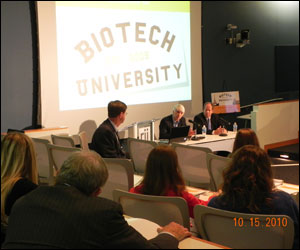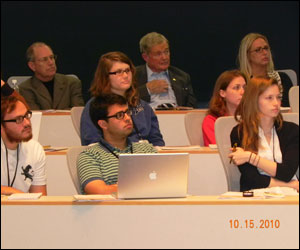Journalism Students and Sen. ‘Kit’ Bond Experience Biotech U; Reporting Contest Underway
By Steve Veile
Manager, Biotech University
Columbia, Mo. (Oct. 22, 2010) — Missouri School of Journalism students experienced a weekend workshop filled with the science, business, and political implications of biotechnology. But students weren’t the only ones in attendance at “Biotech University.” Making a surprise appearance at the event was U.S. Sen. Christopher S. “Kit” Bond.

Bond, for whom the MU Bond Life Sciences Center is named, said he came to listen to the keynote address by Roger Beachy and to observe the interaction between Beachy and the students. Beachy is the director of the National Institute of Food and Agriculture in Washington and was the founding president of the Danforth Plant Science Center in St. Louis.
After being immersed in the topic of biotechnology, students are now facing off in a reporting contest to claim a trip overseas or a scholarship.
Biotech University is sponsored and funded by the United Soybean Board and co-sponsored by the Missouri School of Journalism and the National Center for Soybean Biotechnology. The seminar was held October 15-16 at the Reynolds Journalism Institute on campus. Experts on biotechnology explained what it is, gave hands-on demonstrations of how it is done, and focused on newsworthy issues surrounding biotechnology.
Forty-two journalism students registered for the workshop and of those, 24 completed the requirements to enter the reporting contest. They are invited to write articles or develop broadcast stories about biotechnology. News articles, feature stories, and video, audio, and multimedia pieces are among the items students can submit for review and scoring by a panel of independent judges. The grand prize is an all-expense paid blogging trip to an international biotechnology conference overseas. Second and third place winners in both graduate student and undergraduate student categories will receive scholarships of $2,000 and $1,000, respectively.

Student journalists heard from a wide array of speakers at Biotech University, including Kelly Gillespie, executive director of MoBio, who introduced students to the breadth of biotechnology worldwide; Shari Freyermuth, who taught students how to extract DNA from a banana; and Bill Lambrecht, Washington Bureau Chief for the St. Louis Post-Dispatch.
Beachy was the keynote speaker on the first day of Biotech University. Now a chief scientist with the USDA, he contributed to the development of the world’s first genetically modified food crop, a variety of tomato that was resistant to viruses. He explained to the audience the progress made in the field of biotechnology and some of the controversies with the science.
On day two, Lambrecht, author of Dinner at the “New Gene Café” and “Big Muddy Blues,” approached biotechnology from a reporter’s point of view. He told of his travels around the world covering biotechnology when it was in its infancy. He encouraged the student journalists to embrace the science with a healthy skepticism, urging students to “read, read, read,” and “write, write, write.”
After Lambrecht’s talk, students were able to get out of the classroom and see biotechnology in action. They visited the labs of the National Center for Soybean Biotechnology and saw demonstrations from a gene gun and experiments with molecular breeding. They then were given a tour of the MU Bradford Research Center by Superintendent Tim Reinbott. The president of the Missouri Soybean Association, Kelly Forck, was also on hand to tell students what biotechnology means to him as a working farmer.
The Biotech University program is solely funded by the United Soybean Board, which is composed of 68 farmer-directors who oversee investments of the soybean checkoff, a research and promotion program funded by U.S. soybean farmers.
Updated: December 1, 2020